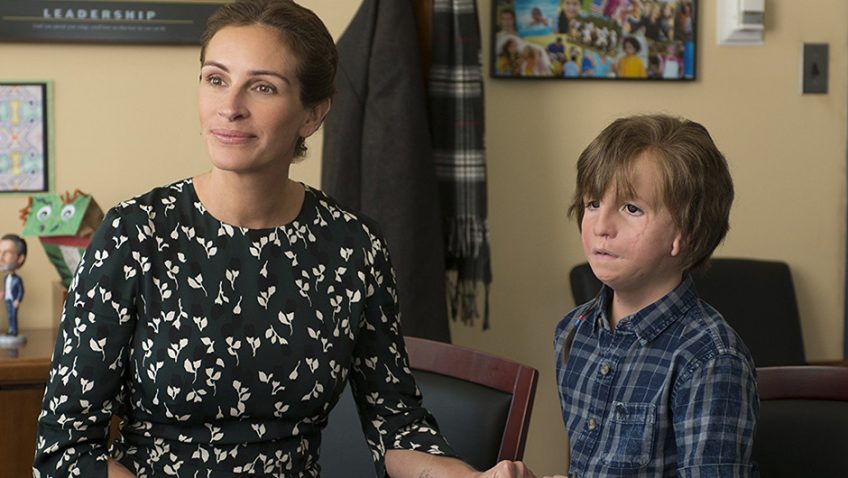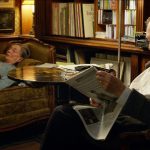Robert Tanitch reviews the latest DVDs
Wonder (Lionsgate) is aimed at family audiences who want to feel good and have a cry but not get too bogged down in the reality. A boy with severe facial deformity goes to school for the first time. It would be difficult not to be moved. The script, directed by Stephen Chbosky, has his heart in the right place, arguing for compassion and acceptance. It promotes kindness and has zero toleration for bullying in schools. The boy is played by the talented and articulate 11-year-old Jacob Tremblay, mature beyond his years, who won an Oscar when he was 8 (the youngest actor to do so) for his performance in Room. Tremblay is completely unrecognisable. The silicone prosthetics took 90 minutes each day to put on and 30 minutes to take off. Noah Jupe is cast as his best friend. The kids carry the film, which has been a huge box office success. Julia Roberts and Owen Wilson are the parents.
Happy End (Curzon) Michael Haneke’s oeuvre includes Hidden, The White Ribbon and Amour. His latest work, a series of episodes strung together and including text messaging and iPhone images and starring Isabelle Huppert, is very disappointing. An 85-year-old man (played by the legendary Jean-Louis Trintignant) smothered his wife and wants somebody to assist him to commit suicide. He is turned down by some immigrants and his long-time barber. His 13-year-old granddaughter who murdered a schoolgirl and her hamster might help him out. There is potential for drama when a group of Algerians gatecrash an all-white dinner party but is not developed.
An Actor’s Revenge (BFI) is a Japanese melodrama directed by Kon Ichikawa in cinemascope in 1963 and starring the legendary Kazuo Hasegawa in his 300th screen role. He had already played the Kabuki female impersonator way back in 1936 when he was 27. Now at 55 he was a bit old to be cast as a man bent on avenging the murder of his parents. Hasegawa also played a thief, a clever double act. The action is played out on a vast stage which seems to get wider and wider. The production is very stylised, very dark and flamboyantly theatrical.
Sacha Guitry: Four Films 1936-1938 (Arrow). Sacha Guitry (1895-1957), playwright, actor, director and son of a famous actor, Lucien Guitry, wrote 125 plays. He was a major figure on the Paris stage in the 1930s. He has been likened to Moliere and Noel Coward. He would turn his sophisticated boulevard comedies into instant films, aimed at the public who couldn’t get to the theatre.
Indiscretions (Le nouveau testament) (1936). A wife (Betty Daussmond) cheats on her husband (Guitry) and he pays her back in kind. The actors behave as if they were still on stage. It’s badly filmed theatre. Guitry adored women (he married five times) but he never stopped disparaging them in his plays, which were artificial soufflés of sexual intrigue.
My Father Was Right (Mon père avait raison) (1936). A father (Guitry), separated from his wife for 20 years, raises his son (Paul Bernard) not to trust women. He argues women are born to be wives, mothers and liars; men, on the other hand, are born bachelors and should not marry young. Gaston Dubosc, who plays the grandfather, is even more flamboyant than Guitry.
Let’s Have a Dream (Faisons un rêve…) (1936). A comedy for three characters: husband, wife and lover. The worst trick you can play on a man who steals your wife is to let him have her. The high spot is a very long monologue for Guitry whilst he awaits the long delayed arrival of his mistress (the vivacious Jacqueline Delubac, his wife in real life). In desperation he phones her and the monologue, already a tour de force, goes on and on and on. Raimu played the cuckolded husband.
Up the Champs-Élysées (Remontons les Champs-Élysées) (1938) is a richly costumed pageant from 1617 onwards. Guitry plays a schoolteacher giving a comic potted French history lesson and casts himself as Louis XV. It would not be long before the Nazis would be marching up the Champs Elysees. Guitry continued to act on stage and make films during World War 2 and because he did so, when the war was over, he was accused of collaborating with the Germans and arrested. The charges were eventually dropped.
To learn more about Robert Tanitch and his reviews, click here to go to his website








